Papers by Eduardo Mangaoang
Cooperative Research Centre for Tropical Rainforest Ecology and Management. Rainforest CRC, Cairns, Dec 1, 2002
This work is copyright. The Copyright Act 1968 permits fair dealing for study, research, news rep... more This work is copyright. The Copyright Act 1968 permits fair dealing for study, research, news reporting, criticism or review. Selected passages, tables or diagrams may be reproduced for such purposes provided acknowledgment of the source is included. Major extracts of the entire document may not be reproduced by any process without written permission of the Chief Executive Officer, CRC for Tropical Rainforest Ecology and Management.
This paper discusses the method and process of conducting the perimeter survey of farms identifie... more This paper discusses the method and process of conducting the perimeter survey of farms identified for the ACIAR Tree Farm project. There were two sets of information on existing tree farms used in identifying farms for the study− from the Department of Environment and Natural Resources (DENR) and Local Government Units (LGUs). Within a municipality, barangays with the greatest number of qualified tree farms were given priority for validation of farm area and number of trees. A courtesy appearance and discussion with LGU ...
This paper introduces the concept of 'governance' in relation to smallholder forestry, and examin... more This paper introduces the concept of 'governance' in relation to smallholder forestry, and examines governance issues concerning tree registration and harvest and transport approval in the Philippines. The difficulties faced in relation to tree registration by the various stakeholder groups-particularly the DENR and smallholders-are examined, and potential regulatory reforms reviewed. It is concluded that there is scope for improvements in tree registration and related regulations, but there are strong impediments to change.

… ASEM/2000/088 …, 2011
Demand for timber in Leyte Province continues to increase whilst supplies from domestic sources h... more Demand for timber in Leyte Province continues to increase whilst supplies from domestic sources have contracted following the suspension of logging in remaining natural forests. One means to make up the deficit in timber supplies has been to encourage timber planting by smallholders. A survey was undertaken in four rural communities to help assess the present tree planting and management activities of households and their tree planting and management intentions. It was found that about 61% of the households who have planted trees do not manage more than 100 trees. There were 88 different species planted or managed by households, but 83% of the total trees planted belong to 10 most preferred species, including mahogany, ipil-ipil, gmelina and molave. The primary purpose of tree planting is to meet the household's own needs for timber for dwelling construction and fruit production. About 72% of the total trees being managed by households were planted, as distinct from natural regeneration, with planting stock coming mostly from own seeds, nursery and wildlings. Only four respondents had registered any of their trees with the Department of Natural Resources and Environment (necessary for commercial harvesting), the main reason for lack of registration appearing to be lack of awareness of this procedure.
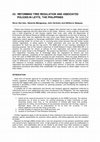
Filipino tree farmers are required by law to register their planted trees in order obtain harvest... more Filipino tree farmers are required by law to register their planted trees in order obtain harvest and transport approvals and thus allow them to sell timber. However, survey evidence reveals that only a small proportion of tree farmers register their trees. Also, while the Department of Environment and Natural Resources (DENR) encourages tree registration at the time of planting, in most cases when trees are registered this only occurs soon before harvesting. The current tree registration system appears to discourage smallholder timber production, with Leyte smallholders mostly growing timber for on-farm use, or receiving lower prices because they sell timber locally without registration, or being captive to timber merchants who carry out the registration procedures for them but pay low log prices. The DENR lacks of tree inventory information for planning purposes. One of the research objectives of ACIAR Research Project ASEM/2003/052 is to examine the potential for reform of polici...
Small-scale Forestry, 2011
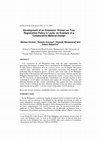
Annals of Tropical Research
Tree registration in the Philippines helps meet the legal requirements for harvesting and transpo... more Tree registration in the Philippines helps meet the legal requirements for harvesting and transport of timber, and is encouraged by the Philippines Government. To help improve information flow an extension primer was developed. The primer contains basic information on tree registration, harvesting, log transport and marketing. The development process involved input from staff of the Philippine Department of Environment and Natural Resources, tree farmers, furniture dealers, the Philippine National Police, the World Agroforestry Centre, Visayas State University and The University of Queensland. Key stakeholders were brought together at three workshops to review policy information and explore the interactions between, and differing opinions of, the various stakeholders. The primer has been distributed widely. Positive feedback has been obtained, although testing has shown that further improvements are possible. A revised version of the primer is to be produced.
This paper introduces the concept of ‘governance ’ in relation to smallholder forestry, and exami... more This paper introduces the concept of ‘governance ’ in relation to smallholder forestry, and examines governance issues concerning tree registration and harvest and transport approval in the Philippines. The difficulties faced in relation to tree registration by the various stakeholder groups – particularly the DENR and smallholders – are examined, and potential regulatory reforms reviewed. It is concluded that there is scope for improvements in tree registration and related regulations, but there are strong impediments to change.
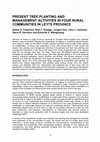
Demand for timber in Leyte Province continues to increase whilst supplies from domestic sources h... more Demand for timber in Leyte Province continues to increase whilst supplies from domestic sources have contracted following suspension of logging in remaining natural forests. One approach to meet the deficit in timber supplies has been to encourage timber planting by smallholders. A survey was undertaken in four rural communities to help assess present tree planting and management activities of households and their tree planting and management intentions. It was found out that not more than 100 trees are managed by each of about 61 % of the households who have planted trees. There were 88 different species planted or managed by households, but 83 % of the total trees planted belong to only 10 species, including mahogany, ipil-ipil, gmelina and molave. The primary purpose of tree planting is to meet household needs for timber for dwelling construction and fruit production. About 72 % of the total trees being managed by households were planted, as distinct from natural regeneration, wi...
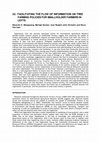
Experiences from the previous Australian Centre for International Agricultural Research (ACIAR)−f... more Experiences from the previous Australian Centre for International Agricultural Research (ACIAR)−funded research project on Smallholder Forestry suggest that improving the uptake of forestry particularly by smallholders requires increased financial returns from their tree farms. In order for smallholders to realize attractive financial returns they should have better access to markets of their tree farm products. Philippine smallholder tree farmers are governed by Department of Environment and Natural Resources policies and regulations which require them to register their trees before harvest and transport of tree farm products. Research findings, however, indicate that most smallholder farmers lack an awareness and understanding of the policies on tree registration, harvesting, transport and marketing. It was also found that Community Environment and Natural Resource Officers have varying ways of policy implementation due to the differences in their understanding and interpretation of the tree registration policy. Participants of a workshop conducted as part of the community survey study of Emtage et al. (2004), and those attending a number of policy workshops, suggested the need to improve the flow of information to establish a clear and common understanding of tree registration and associated policies. Researchers in the ACIAR-funded project on Improving Financial Returns of Smallholder Tree Farmers in the Philippines have developed the Primer on Tree Registration, Harvesting, Transport and Marketing in Private Lands to improve awareness and understanding of the policies among the smallholder tree farmers and plantation owners, Department of Environment and Natural Resources personnel and other stakeholders. The development of the Primer followed a participatory process and was done in a well-organized fashion to ensure that the concerns of all stakeholders were taken into consideration. This paper presents the details of the processes involved in the development of the Primer. New and more aggressive methods of dissemination for piloting are also presented to effectively improve the flow of information on tree farming policies among smallholders and other stakeholders. Other schemes of disseminating information that were perceived by the smallholder farmers and other stakeholders to make a difference to their awareness and understanding of the tree farming policies are also discussed. As action research activity, the undertaking also involves monitoring activities to assess what impact the Primer has on smallholders' attitude towards tree registration in particular, and the promotion of small-scale forestry in general.
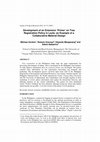
Tree registration in the Philippines helps meet the legal requirements for harvesting and transpo... more Tree registration in the Philippines helps meet the legal requirements for harvesting and transport of timber, and is encouraged by the Philippines Government. To help improve information flow an extension primer was developed. The primer contains basic information on tree registration, harvesting, log transport and marketing. The development process involved input from staff of the Philippine Department of Environment and Natural Resources, tree farmers, furniture dealers, the Philippine National Police, the World Agroforestry Centre, Visayas State University and The University of Queensland. Key stakeholders were brought together at three workshops to review policy information and explore the interactions between, and differing opinions of, the various stakeholders. The primer has been distributed widely. Positive feedback has been obtained, although testing has shown that further improvements are possible. A revised version of the primer is to be produced.
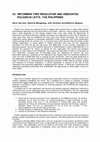
Filipino tree farmers are required by law to register their planted trees in order obtain harvest... more Filipino tree farmers are required by law to register their planted trees in order obtain harvest and transport approvals and thus allow them to sell timber. However, survey evidence reveals that only a small proportion of tree farmers register their trees. Also, while the Department of Environment and Natural Resources (DENR) encourages tree registration at the time of planting, in most cases when trees are registered this only occurs soon before harvesting. The current tree registration system appears to discourage smallholder timber production, with Leyte smallholders mostly growing timber for on-farm use, or receiving lower prices because they sell timber locally without registration, or being captive to timber merchants who carry out the registration procedures for them but pay low log prices. The DENR lacks of tree inventory information for planning purposes. One of the research objectives of ACIAR Research Project ASEM/2003/052 is to examine the potential for reform of polici...
… Methods in Forestry: A Training Manual, 2002
Eduardo O. Mangaoang. ... undertaking of CF, LSU and the International Centre for Research in Agr... more Eduardo O. Mangaoang. ... undertaking of CF, LSU and the International Centre for Research in Agroforestry (ICRAF), Visayas, (CF and ICRAF 2002) have provided clear evidence of the high level of knowledge and skills and active involvement of smallholder farmers in forest ...
This paper outlines the application of Systems Thinking in investigating ways to improve the retu... more This paper outlines the application of Systems Thinking in investigating ways to improve the returns to smallholder tree farmers in the Philippines. The paper illustrates how a systems approach was used in the conceptualisation of the project and how systems thinking facilitated a shared understanding of the how each individual's research contributed to the broader project activities. Systems Thinking has also been used in the design and implementation of various project activities. Three examples are provided. The first ...
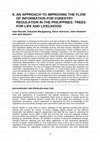
Tree registration is necessary for the harvest and sale of timber in the Philippines. However, tr... more Tree registration is necessary for the harvest and sale of timber in the Philippines. However, tree registration and harvest and transport approvals are cited as critical constraints to tree growing and market access for existing tree farmers. There is a lack of knowledge of policies and regulations dealing with the ownership of trees, and their harvest, transport and sale, both within the community and even in branches of government. These conditions point to the need for improving the flow of information relating to regulation, from the Department of Environment and Natural Resources (DENR) through Local Government Units and other agencies, to communities, so as to improve market conditions and access. An approach is suggested combining systems thinking and action research. This approach centres on the creation of action research teams involving government and university staff together with community representatives. The choice of action research methods is well suited to the comp...
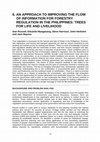
Tree registration is necessary for the harvest and sale of timber in the Philippines. However, tr... more Tree registration is necessary for the harvest and sale of timber in the Philippines. However, tree registration and harvest and transport approvals are cited as critical constraints to tree growing and market access for existing tree farmers. There is a lack of knowledge of policies and regulations dealing with the ownership of trees, and their harvest, transport and sale, both within the community and even in branches of government. These conditions point to the need for improving the flow of information relating to regulation, from the Department of Environment and Natural Resources (DENR) through Local Government Units and other agencies, to communities, so as to improve market conditions and access. An approach is suggested combining systems thinking and action research. This approach centres on the creation of action research teams involving government and university staff together with community representatives. The choice of action research methods is well suited to the complex situation, the need for change and the spirit of community involved in working with smallholder tree farmers. The key to changing information flow, bureaucratic regulation and community understanding lies in the combination of environmental goals to protect tree cover and biodiversity and the livelihood needs of smallholders. There is a need to promote farm forestry as a means of protecting the environment, and providing vital ecosystem services and opportunities for income generation from renewable resources. There is also a need for government staff to listen to and understand the needs of the farmers involved in forestry. The selected approach is intended to stimulate a passion for making a difference for rural livelihoods, and to promote a simple message of 'trees for life and livelihood'.
Books, Manuals & proceedings by Eduardo Mangaoang
Book chapters & Conference papers by Eduardo Mangaoang
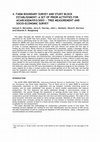
This paper discusses the method and process of conducting the perimeter survey of farms identifie... more This paper discusses the method and process of conducting the perimeter survey of farms identified for the ACIAR Tree Farm project. There were two sets of information on existing tree farms used in identifying farms for the study − from the Department of Environment and Natural Resources (DENR) and Local Government Units (LGUs). Within a municipality, barangays with the greatest number of qualified tree farms were given priority for validation of farm area and number of trees. A courtesy appearance and discussion with LGU officers was always the first step to finding the tree farms. Being referred or accompanied by somebody, usually a barangay official, each qualified tree farmer was visited in their house. The decision to establish and number of tree blocks to consider in a farm was based on age of the plantation, area, species and species mixture, spacing, average size of trees, topography, slope, elevation, presence of vegetative cover particularly grasses and shrubs, soil charac...







Uploads
Papers by Eduardo Mangaoang
Books, Manuals & proceedings by Eduardo Mangaoang
Book chapters & Conference papers by Eduardo Mangaoang